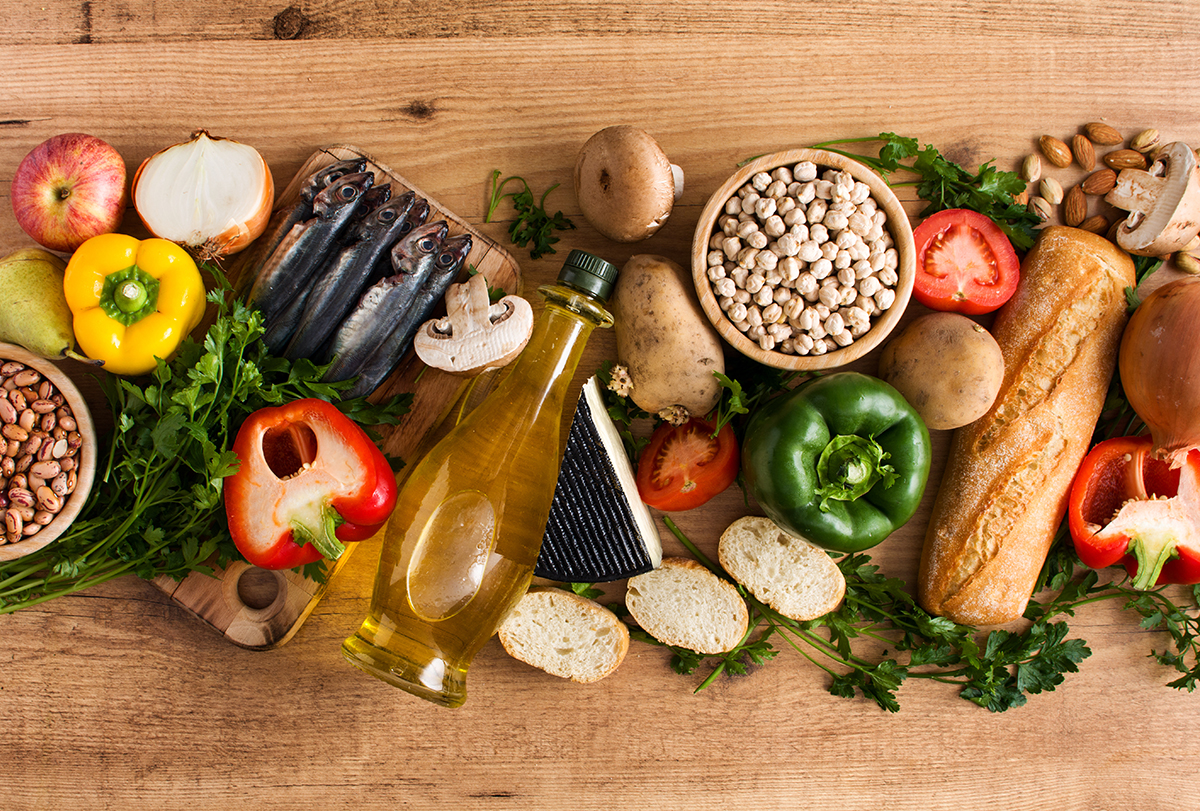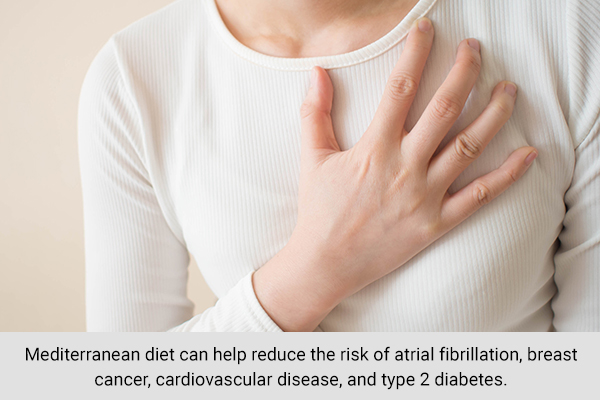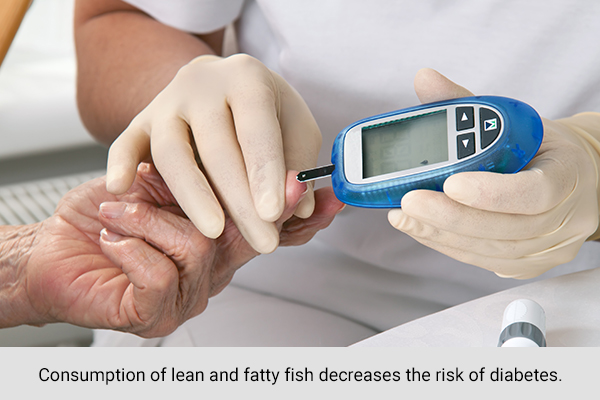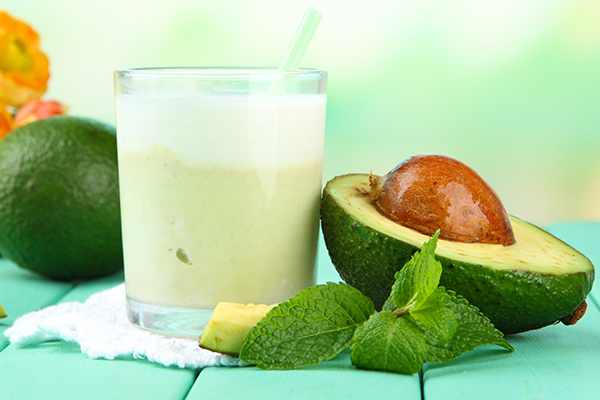In this article:
The Mediterranean diet emerges from the kind of foods eaten in countries situated along the Mediterranean Sea. These include France, Greece, Southern Italy, and Spain.

The diet consists of whole foods such as beans, fish, fruits, vegetables, and whole grains. These foods provide the body with carbohydrates (for energy), protein (for muscle growth), healthy fats (for rebuilding cell membranes), natural fibers (for better digestion), and vitamins and minerals (for growth). It aims to avoid dairy products, red meats, and sweets.
In this way, it is similar to diets that enhance heart health. Otherwise, it is distinct as it promotes the intake of calories from healthy fat sources such as olive oil and includes moderate consumption of wine.
The Mediterranean diet is affordable, sumptuous, and healthy. It combines diet and lifestyle, motivating you to be energetic and in high spirits. It promotes enjoying food and company and having a positive body experience and a sense of well-being.
The Mediterranean food pyramid has beans, fruits, herbs, legumes, nuts, olive oil, seeds, spices, and whole grains at the bottom, indicating that these foods should be consumed frequently and serve as the foundation of the diet.
The second level has fish and seafood. The third level consists of eggs, dairy, and poultry. Finally, the topmost level contains beef, lamb, pork, and sweet items. The frequency and servings of foods to be consumed from each of the groups decrease from bottom to top.
Note: Foods mentioned on the third and the topmost level should be consumed in minimal amounts if you are trying to manage your weight.
Main Components of the Mediterranean Diet
Here are the basic elements of the Mediterranean diet.
1. Fruits and vegetables
Any diet that promotes heart health advises you to consume fruits and vegetables as they decrease the susceptibility of individuals to cardiovascular problems.
Fruits and vegetables help provide a sense of satiety; hence, they can help lower your body mass index (BMI). In addition, they supply the body with myriad micronutrients.
Evidence suggests that fruits and vegetables possess ample antioxidants and flavanols. As opposed to red meat, increased consumption of fruits and vegetables does not increase the blood pressure of middle-aged men.
The fruits that form a part of the Mediterranean diet are as follows:
- Figs
- Apples
- Apricots
- Peaches
- Melons
- Cherries
- Grapes
- Grapefruits
- Clementine
- Pomegranate
- Avocados
- Pears
- Dates
- Nectarines
- Strawberries
- Tomatoes
- Tangerines
- Oranges
- Olives
The vegetables that form a part of the Mediterranean diet are as follows:
- Beets
- Radishes
- Mushrooms
- Eggplant
- Peppers
- Cucumber
- Leeks
- Okra
- Broccoli
- Lettuce
- Kale
- Mustard greens
- Carrots
- Potatoes
- Pumpkins
- Onions
- Lemons
- Celery
- Fennel
- Peas
- Brussels sprouts
- Cabbage
- Dandelion greens
- Collard greens
- Fruits should be eaten one to two times with a total intake of 2 cups every day.
- Vegetables should be consumed two or more times with a total intake of 2–2½ cups every day. (1)
Note: Fruit and vegetable intake should be in moderate amounts so that your diet is nutritious while still low in calories. (2)
2. Seafood
The Mediterranean diet is touted to be a promoter of a healthy life. Seafood became a part of this diet because the origin countries were located near the sea. (3)
The affluent people in this region in the early times preferred fish that was fresh out of the sea and had been grilled or fried in olive oil. They ate seafood, particularly oysters, raw or fried. (4) Moderate consumption of seafood is known to have health benefits. Seafood is abundant in amino acids, minerals, omega-3 fatty acids, and vitamins.
The n-3 polyunsaturated fatty acids are also found in seafood, and this compound is not present in land organisms. These functional constituents of seafood help reduce the risk of arteriosclerotic and thrombotic disease. (5)
The Mediterranean diet consists of the following seafood:
- Squid
- Flounder
- Sardines
- Salmon
- Tilapia
- Shrimp
- Whelk
- Oyster
- Crab
- Octopus
- Tuna
- Mackerel
- Yellowtail
- Sea bass
- Eel
- Clams
- Cockles
- Mussels
- Lobster
- Eat two or more servings of seafood in a week; one serving is 3 ounces. (1)
- You can bake, broil, grill, poach, roast, or sauté the fish before eating.
Note: Refrain from eating seafood like king mackerel, shark, shellfish, swordfish, and tilefish as these have increased quantities of mercury.

3. Good fats
The Mediterranean diet contains low amounts of saturated fats and high amounts of unsaturated or “good” fats. (2) The good fats consist of monounsaturated and polyunsaturated fats, which boost our cardiovascular health.
Good fats also play a role in maintaining our overall health.
- They decrease our blood pressure.
- They reduce the risk of cardiovascular diseases by lowering triglyceride levels and combating inflammation.
- They help decrease the bad LDL and increase the good HDL cholesterol levels.
- They regularize abnormal heartbeats.
The sources of monounsaturated fats include:
- Avocados
- Nuts (almonds, cashews, hazelnuts, macadamia nuts, peanuts, pecans)
- Oils (canola, olive, peanut, sesame)
- Olives
- Peanut butter
The sources of polyunsaturated fats include:
- Fatty fish (herring, mackerel, salmon, sardines, trout, tuna)
- Oils (corn, safflower, soybean)
- Seeds (flaxseed, pumpkin, sesame, sunflower)
- Soymilk
- Tofu
- Walnuts
4. Whole grain
Wholegrain cereals are naturally enriched with several nutrients such as minerals, natural fibers, vitamins, lignans, phytochemicals, phenolic compounds, and a number of bioactive components.
These nutrients have a positive impact on health, and it has been shown that increased consumption of whole-grain cereals decreases the susceptibility of type 2 diabetes by around 20%–30%.
Consistent consumption of whole-grain cereals and its products helps decrease the risk of colorectal polyps, colorectal cancer, and other cancers that may develop in the gastrointestinal tract and pancreas or cancers that are due to certain hormones. Whole grains can also make you less prone to noncommunicable chronic ailments. (6)
Your diet should have one to two servings of whole-grain cereals, or its products, at every meal. (1)
One serving would consist of one of any of the following:
- 6-inch pita bread (whole wheat)
- 6 crackers (whole grain)
- 1 slice of bread (whole wheat)
- 1 small roll (whole grain)
- ½ large bun (whole grain)
- ½ cup cooked cereal (whole-grain – cracked wheat, oatmeal, quinoa)
- ½ cup cooked barley, brown rice, and pasta (whole wheat)
- ½ cup corn, peas, potatoes, peas, and sweet potatoes
5. Dairy products
Dairy products are to be consumed in low to moderate levels when following a Mediterranean diet. The dairy intake should primarily consist of cheese and yogurt. (3)
One serving means 1 ounce of low-fat cheese or 1 cup of nonfat yogurt made from skimmed milk.
6. Meat
Small portions of red meat consumed now and then can be associated with some health benefits. (3)
According to a 2016 study published in the Proceedings of the Nutrition Society, when red meat is consumed in addition to a diverse and wholesome diet, it provides adequate protein and other essential nutrients. These nutrients have greater bioavailability when obtained from red meat than when obtained from other food sources. In moderation, red meat may also help with weight maintenance as its consumption is linked with satiety. (7)
You should eat less than two servings of red meat a week with one serving being equal to 1 ounce of meat.

7. Wine
Wine is a significant part of the Mediterranean diet and, when consumed in moderation, it has various health benefits.
Wine has a myriad of polyphenolic substances, especially anthocyanins, catechin, epicatechin, flavanols, polyphenolic acids, proanthocyanidins, and stilbene resveratrol. These substances are advantageous to your health. Resveratrol particularly possesses anticarcinogenic, anti-inflammatory, and antioxidant features. It increases the activity of SIRT1 (a protein), thereby increasing your life. (8)
According to a 2016 study published in Critical Reviews in Food Science and Nutrition, moderate intake of wine along with a varied and nutritious diet full of cereals, olive oil as the primary fat source, plant-based products, and occasional consumption of red meat is beneficial.
The Mediterranean way of drinking means regular but moderate drinking with food, around two 6-ounce glasses every day for men and one 6-ounce glass for women. Controlled intake of wine can make you less prone to cardiovascular diseases and does not increase cancer risk. It may also add years to your life. (8)
Note: Include red wine as part of your meal plan only if you drink alcohol. If you don’t already drink, then do not start drinking merely for health benefits or otherwise. Refrain from consuming any other alcoholic drink aside from red wine.
Meal Plan for the Mediterranean Diet
If you are following a Mediterranean diet, every meal should consist of the following food items.
- ½ cup cooked beans
- ½ cup of cereals or cooked pasta/1 slice of bread (whole grain)
- ½ cup of raw/cooked fruits and vegetables
- ¼–½ teaspoon of dried or fresh herbs
- 1–2 garlic cloves daily
- ½ teaspoon oil for each serving size
- 1 glass of red wine with every evening meal
Benefits of the Mediterranean Diet

A Mediterranean diet that consists of plant foods that have undergone little processing has various benefits. It makes you less prone to a number of chronic illnesses and increases longevity.
Scientific research has shown that following a Mediterranean diet can help reduce the risk of atrial fibrillation, breast cancer, cardiovascular disease, and type 2 diabetes.
There is a lack of conclusive proof on the benefits of the Mediterranean diet. The limited proof that we do have suggests that it has the following effects on the body: (9)
- It lowers the lipid levels in your body.
- It relieves inflammation and oxidative stress.
- It slows down the accumulation of platelets.
- It helps inhibit the proliferation of cancerous cells, thereby decreasing the spread of this deadly disease and reducing your risk of developing it.
- It improves your metabolism.
1. Promotes heart health
Olive oil: Extra virgin olive oil has antioxidant features, as it contains simple and complex phenols. Olive oil may reduce the risk of cardiovascular ailments due to the presence of water-soluble phenolic compounds. These include the compounds that have a lower molecular weight that attack free radicals and regulate the enzymes.
Note: Calorically exact portions of each component are recommended by healthcare professionals for heart diseases to be prevented. (2)
Dairy products: Dairy products contain lots of nutrients such as calcium, phosphorus, magnesium, zinc, potassium, iodine, peptides, and vitamins A, B2, B6, and B12.
Phosphorus brings down blood pressure, hence it may decrease the risk of heart problems. Calcium may assist you in controlling your weight. Magnesium finds its importance in the management of blood pressure. Both calcium and magnesium may help you in increasing your insulin sensitivity and improve your lipid levels.
Following a Mediterranean diet that is rich in calcium sources and has modest amounts of dairy products may decrease the risk of cardiovascular ailments in vulnerable individuals. (10)
2. May reduce the risk of diabetes

Fish intake: Results of an ecological study consisting of a group of overweight people showed that increased intake of seafood may reduce the susceptibility of an individual towards type 2 diabetes. In a study on certain British subjects, it was concluded that the consumption of lean and fatty fish decreases the risk of diabetes. (5)
3. May prove helpful for cancer patients
A Mediterranean diet contains fish, herbs, olive oil, whole grains, and high amounts of fruits and vegetables. It has polyunsaturated fatty acids of the omega-3 and the omega-6 group in a ratio of 1:2.
The vegetables have antioxidant vitamins (vitamins A, C, and E), carotenoids, flavonoids, lycopene, natural fibers, polyphenols, and resveratrol, among other bioactive constituents. All of these may contribute to the anticancer (particularly for breast cancer), anti-inflammatory, and antioxidant features of this diet.
More comprehensive proof is required to examine the role of the Mediterranean diet in the prevention of breast cancer. However, women who are susceptible to breast cancer may be advised to follow the Mediterranean diet. It may also be recommended to patients who already have breast cancer to slow down the development of the illness. (11)
Drawbacks of the Mediterranean Diet
The Mediterranean diet offers so many benefits as mentioned, but there are also a few downsides to following this diet. These include:
1. Promotes obesity

Although the Mediterranean diet usually fulfills your nutritional requirement, there are certain specifications that they don’t stick to. In a majority of Mediterranean diets, the calorie intake is dominantly from fat sources. Hence, this diet can cause obesity.
2. Seafood contains mercury
Seafood is replete with omega-3 fatty acids and proteins. However, several kinds of fish and shellfish have large amounts of mercury in them. King mackerel, shark, swordfish, and tilefish have increased quantities of mercury. Constant consumption of these fishes can increase the mercury level in your body.
You can go for seafood like canned light tuna, catfish, pollock, salmon, and shrimp, which have low levels of mercury.
Myths About the Mediterranean Diet
Myth #1: The Mediterranean diet is not easily affordable.
Fact: Legumes and lentils that provide protein form a major part of the Mediterranean diet. They are fairly inexpensive. Also, there is minimal consumption of processed foods, thereby further reducing the expenses.
Myth #2: If 1 glass of wine makes your heart healthy, then 3 glasses mean thrice the health benefits.
Fact: Consumption of moderate amounts of wine can be effective in maintaining your heart health. However, drinking red wine excessively can cause several cardiovascular ailments.
Expert Answers (Q&A)
Answered by Ms. Amy Gorin (Registered Dietitian and Nutritionist)

There are several breakfast options in the Mediterranean diet for you to try out. Try a healthy avocado smoothie, a wild blueberry cauliflower smoothie, a Greek yogurt parfait, chia breakfast pudding, or high-protein overnight oats.
It definitely can be. Research in The Lancet Diabetes & Endocrinology found that olive oil, a staple in the Mediterranean diet, may be helpful for weight loss.
In the study, older adults with type 2 diabetes or high cardiovascular risk ate a Mediterranean diet, plus additional extra-virgin olive oil; a Mediterranean diet plus additional nuts; or a low-fat diet. About five years later, all subjects had lost weight. The people eating the additional olive oil lost the most weight! (12)
Red wine is recommended on the Mediterranean diet list, and this is because, in moderation, it can help your heart health. Women should have no more than a 5-ounce glass of wine daily, and men should have no more than two 5-ounce glasses of wine a day.
Yes, definitely. Unlike many fad diets, the Mediterranean diet is more of a lifestyle change and is easy to follow. There’s a reason that this eating style has been around for a long time. Eating veggies, fruits, fish, olive oil, nuts, beans, legumes, a moderate amount of red wine, and dairy is a sustainable way to eat!
Final Word
Your body needs a constant supply of nutrients to function effectively. So, whatever diet you are following, make sure that your daily nutritional requirement is met.
Also, remember that the results of diets are not instantaneous. You will have to consistently follow a diet if you wish to see desirable changes.
- Was this article helpful?
- YES, THANKS!NOT REALLY


